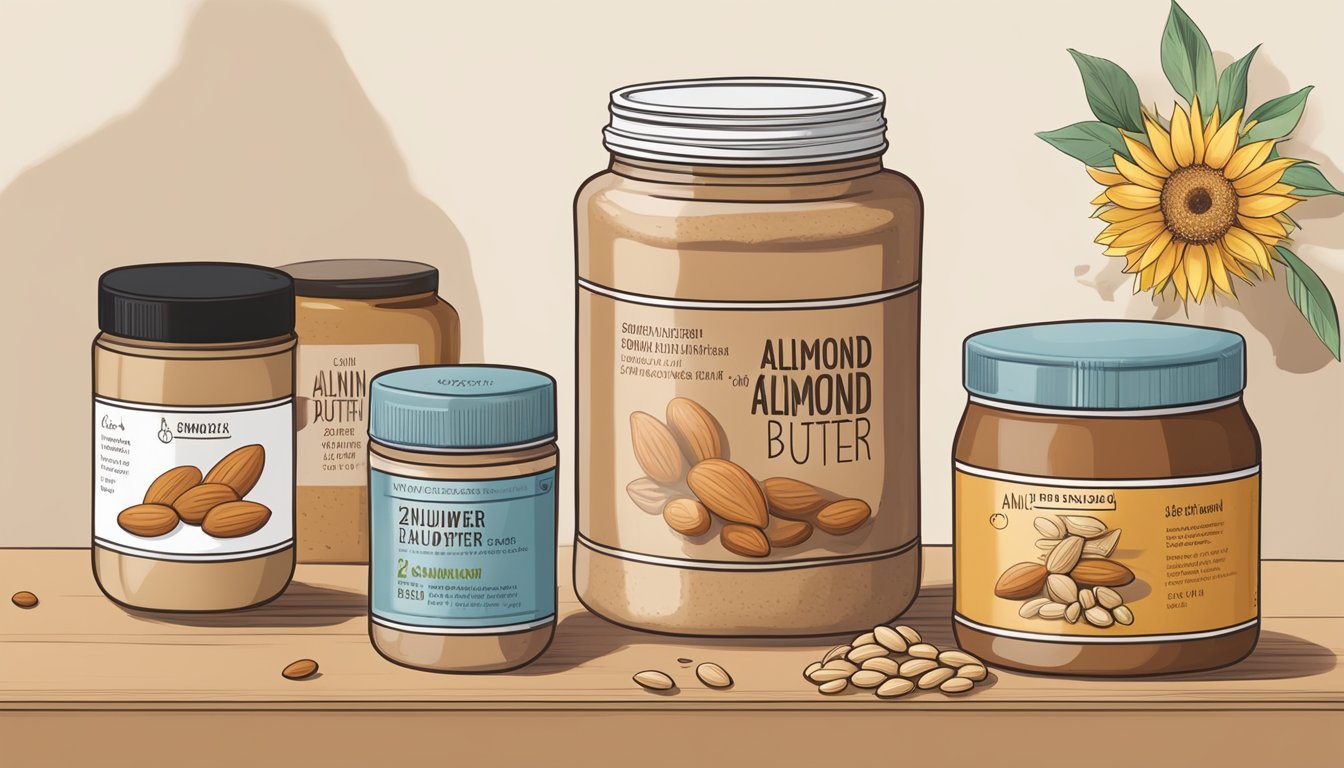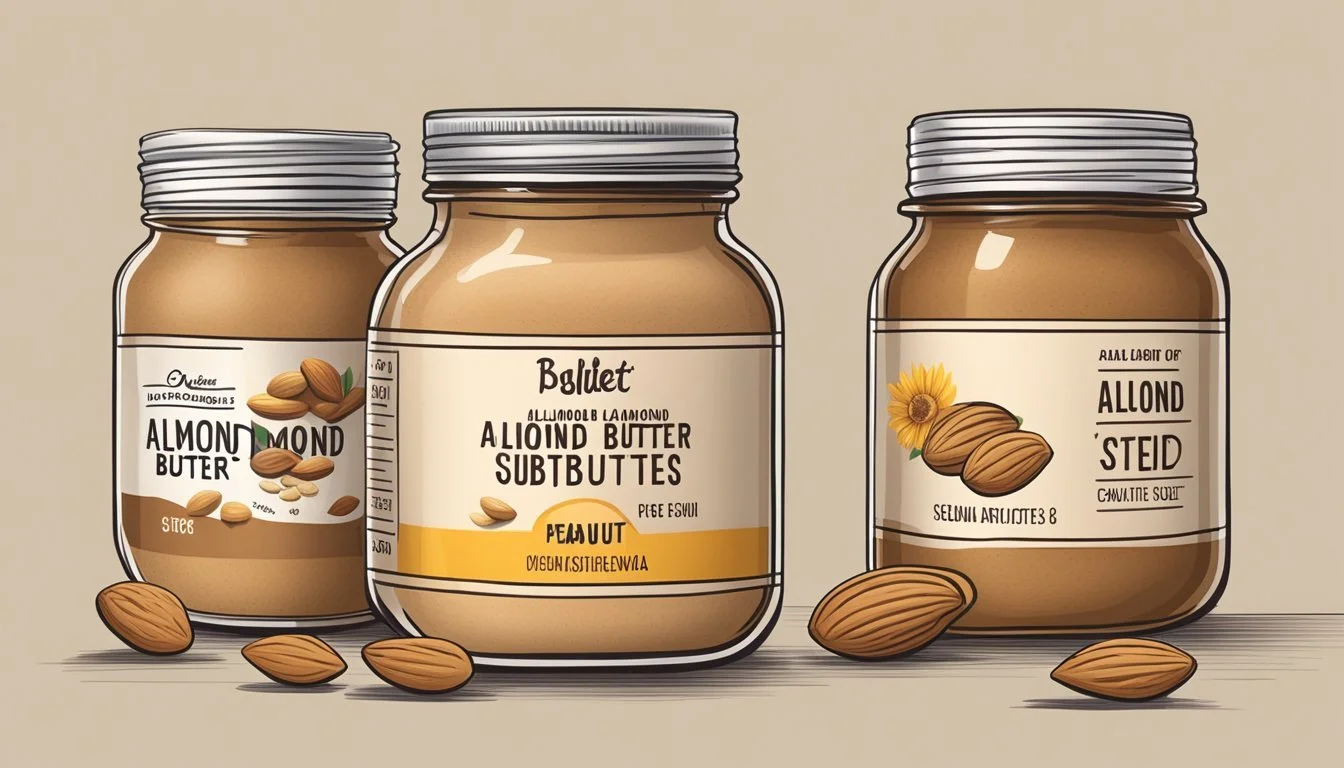Almond Butter Substitutes
Top Alternatives for Baking and Spreads
Almond butter is a popular staple in pantries around the world, prized for its creamy texture and rich, nutty flavor, as well as its high content of healthy fats. However, due to dietary restrictions, allergies, or simply a desire for variety, individuals may seek out alternatives to almond butter. Fortunately, the vast array of available substitutes can cater to a multitude of needs and preferences without compromising on taste or nutritional value.
The potential replacements range from other nut butters, like peanut and cashew butter, which offer similar textures and profiles of healthy fats, to seed-based spreads such as sunflower or pumpkin seed butter, which are excellent nut-free options with their own unique flavors. For those avoiding fats or those with calorie concerns, lower-fat alternatives like Greek yogurt can provide a similar creaminess in recipes. These substitutes are not only versatile and accommodating to various diets but also maintain the integrity of recipes, whether they are used for baking or as a spread.
Understanding Almond Butter
Almond butter is a versatile and nutritious spread that has gained popularity due to its rich flavor and health benefits. It serves as a staple for those looking for plant-based protein sources and contributes beneficial fats to one's diet.
Nutritional Profile
Almond butter is appreciated for its nutritional richness, offering a substantial amount of healthy fats, protein, vitamins, and minerals. A typical serving of almond butter contains the following:
Fat: Primarily composed of monounsaturated fats, known for their heart-health benefits.
Protein: Provides a decent amount of plant-based protein, essential for tissue repair and muscle growth.
Fiber: Contains dietary fiber, which promotes digestive health and can aid in maintaining a healthy weight.
Vitamins and Minerals: Rich in vitamin E, magnesium, and potassium, which are vital for various bodily functions including skin health and electrolyte balance.
Nutrient Quantity per tablespoon Calories 98 Protein 2.4g Fat 9g Fiber 1.6g Vitamin E 3.4mg (23% DV) Magnesium 45mg (11% DV) Potassium 120mg (3% DV)
Popular Uses
Almond butter's creamy consistency and nutty flavor make it widely used as a spread on bread, fruits, and crackers. It's also a common ingredient in baking, lending moistness and flavor to cakes, cookies, and pastries. Due to its nutritional properties and the fats it contains, almond butter serves as an energy-dense ingredient in smoothies, oatmeal, and homemade energy bars where it offers satiety and texture.
Almond Butter Substitutes Explained
Finding an alternative to almond butter is necessary for those with nut allergies or when looking to vary nutritional profiles and flavors in recipes. The following substitutes offer a broad range of options to suit different dietary needs and taste preferences.
Nut Butters
Peanut Butter: A common and widely available substitute.
Cashew Butter: Similar in taste and texture to almond butter.
Hazelnut Butter: Offers a distinct, rich flavor.
Walnut Butter: Rich in omega-3 fatty acids.
Pecan Butter: Provides a buttery and robust taste.
Pistachio Butter: Known for its vibrant color and unique flavor.
Macadamia Butter: Contains high amounts of healthy fats.
Brazil Nut Butter: A less common option with a creamy texture.
Nut-Free Alternatives
Tahini: Made from sesame seeds and has a unique savory flavor.
Nutella: A sweet, chocolate-hazelnut spread, suitable for desserts.
Seed Butters
Sunflower Seed Butter: An excellent nut-free option, especially for those with tree nut allergies.
Pumpkin Seed Butter: A lesser-known substitute with a robust taste.
Soynut Butter: Made from roasted soybeans, it's an allergy-friendly option.
Other Alternatives
Coconut Butter: Made from ground coconut flesh, it’s suitable for those who can’t consume tree nuts.
Soy Butter: A creamy spread made from soybeans, offering an alternative protein source.
Health Considerations and Nutritional Comparison
When considering almond butter substitutes, one should assess the health implications and nutritional content of these alternatives. This analysis includes understanding their fat, protein, mineral, and vitamin content, as well as the calorie count, to ensure a suitable match for dietary preferences and nutritional needs.
Fat Content Comparison
Various almond butter substitutes present different profiles of fat content. For instance, peanut butter and cashew butter are similar in fat content but contain higher amounts of saturated fat compared to almond butter's higher monounsaturated fat content.
Substitutes Monounsaturated Fats Saturated Fats Almond Butter High Low Peanut Butter Moderate Moderate Cashew Butter Moderate Moderate-High Sunflower Seed Butter Moderate Low Tahini High Low
Sunflower seed butter can be a healthier option with a lower saturated fat content, while tahini (sesame seed paste) is rich in healthy fats, particularly monounsaturated fats.
Protein and Mineral Content
Almond butter and its substitutes are good sources of protein. They also contain essential minerals necessary for health. Almond butter typically contains magnesium, calcium, and potassium, but other nut butters offer similar benefits.
Peanut butter: Comparable protein; rich in magnesium and potassium.
Cashew butter: Lower protein; good source of copper and magnesium.
Sunflower seed butter: Comparable protein; offers a substantial amount of selenium and magnesium.
Tahini: Less protein; high in phosphorus and magnesium.
Vitamin Profile Comparison
The vitamin content varies among almond butter alternatives. Almond butter is known for its vitamin E content, important for skin health and immune function. However, alternatives also contribute significant vitamins.
Peanut butter: Contains vitamins B3 and E.
Cashew butter: Provides a range of B vitamins.
Sunflower seed butter: Excellent source of vitamin E.
Tahini: Includes a dose of B vitamins, including folate.
Calorie Comparison
All butter substitutes are calorically dense due to their high fat and protein content. However, calorie counts vary slightly among them.
Substitutes Calories per Tablespoon Almond Butter Approx. 98 Peanut Butter Approx. 94 Cashew Butter Approx. 94 Sunflower Seed Butter Approx. 100 Tahini Approx. 89
Replacing almond butter with sunflower seed butter will slightly increase calorie intake, while opting for tahini will reduce it. Choosing the right substitute depends on one's dietary goals and nutritional considerations.
Culinary Uses and Recipe Adaptations
When adapting recipes that traditionally use almond butter, cooks can utilize a range of substitutes that mirror the original's characteristics, considering factors such as texture and flavor compatibility.
Baking
In baking, substitutes for almond butter must maintain the moisture and texture typically contributed by the nut butter. Butter can replace almond butter with a ratio of ½ to 1 tablespoon of butter for every tablespoon of almond butter to preserve the richness of the dessert. For a nutty flavor, cashew butter proves to be an ideal substitute due to its similar profile; it works well in cookies and pastries.
Smoothies and Dips
Nut butters add a creamy texture and a boost of protein to smoothies and dips. Sunflower seed butter provides a velvety consistency making it a suitable alternative for those with nut allergies. When replacing almond butter in smoothies or dips, use an equal amount of the substitute to ensure the desired creaminess and nutritional value remain consistent.
Spreads and Sandwiches
Almond butter is a common spread for sandwiches due to its creamy texture and rich taste. Coconut butter, made by processing unsweetened flaked coconut, serves as a fitting almond butter substitute in spreads. Although the consistency is slightly more gritty, it sufficiently mimics the desired spreadable quality.
Other Recipes
For various recipes such as granola, oatmeal, or any almond butter recipes requiring an ingredient substitution, alternatives should reflect almond butter's subtle sweetness and binding properties. Pumpkin seed butter offers a unique, slightly earthy taste and dense texture, perfect for these uses. In recipes where almond butter is a chief component, selecting a substitute with a similar composition ensures consistency in the final dish’s flavor and structure.
DIY Alternatives: Making Substitutes at Home
When considering homemade substitutes for almond butter, one can explore various options such as nut butters, seed butters, and other creative spreads. These alternatives offer a range of flavors and can be tailored to dietary needs or personal tastes.
Homemade Nut Butters
Nut butters can be easily crafted at home with a variety of nuts. Homemade almond butter is a simple staple made from roasted almonds. Almonds are processed in a food processor or high-speed blender until smooth, often with a dash of salt to enhance flavor. Other nuts like cashews or walnuts can also be used to make rich, flavorful spreads that retain similar nutrients to almond butter.
Ingredients:
2 cups of nuts (almonds, cashews, or walnuts)
1/4 teaspoon of salt (optional)
Instructions:
Preheat oven to 350°F (175°C).
Spread nuts on a baking sheet and roast for 10-12 minutes.
Let them cool slightly before placing them into a food processor.
Process for several minutes until creamy, scraping down sides as needed.
If desired, add salt during the final minute of processing.
Homemade Seed Butters
Seed butters are excellent nut-free alternatives that can be made from seeds like sunflower or pumpkin (pepitas). Sunflower seed butter is a popular choice and can easily be made by blending roasted seeds until creamy. For those with nut allergies, seed butters provide similar textures and can be a source of healthy fats and proteins.
Ingredients:
2 cups of seeds (sunflower or pumpkin)
1/4 teaspoon of salt (optional)
Instructions:
Spread seeds on a baking sheet and roast at 350°F (175°C) for 10 minutes.
Allow seeds to cool briefly, then transfer to a food processor.
Blend until a smooth consistency is reached, adding salt to taste.
Other Homemade Substitutes
Beyond nuts and seeds, there are other unconventional but effective substitutes for almond butter. Mashed banana is an ingredient that provides moisture and natural sweetness to various dishes, making it a suitable spread. For a richer alternative, unsalted butter can be whipped and combined with ingredients like maple syrup for sweetness or a pinch of salt for flavor. These options offer different nutrient profiles while serving the same purpose in recipes as almond butter does.
Ingredients:
1 ripe banana, mashed
1/4 cup unsalted butter, softened
1 tablespoon maple syrup
Instructions:
Mash the banana in a bowl until smooth.
In a separate bowl, whip the butter until light and fluffy.
Stir in the mashed banana and maple syrup until well combined.
Texture and Flavor Considerations
When substituting almond butter, it is important to understand the impact on both texture and flavor. The goal is to match the creaminess and taste profile as closely as possible to achieve the desired outcome in recipes.
Achieving Creamy Texture
Almond butter provides a distinct creamy texture that is not easily replicated. However, substitutions can be made with careful selection:
Peanut butter and cashew butter are the closest in texture to almond butter and can often be used interchangeably.
Coconut butter offers a similar texture with a more gritty feel, and may be better suited for certain recipes, such as baked goods or smoothies.
Greek yogurt is an excellent option for those looking for a non-nut alternative with a creamy consistency, especially in smoothies or as a spread.
Balancing Flavors
The flavor of almond butter is mild and slightly sweet, which must be considered when choosing a substitute:
Sunflower seed butter and soynut butter can replace almond butter for those with nut allergies, but they may introduce a different flavor profile.
Tahini provides a rich umami flavor that works well in savory dishes but might be too strong for sweet treats.
Granola butter and cookie butter add a unique sweetness suitable for desserts.
Bear in mind the aroma of the substitute, as it can influence the overall sensory experience of the dish.
By choosing a substitute that closely mirrors the creaminess and flavor of almond butter, the integrity of the dish can be maintained.
Allergen-Free Options for Nut Allergies
Individuals with nut allergies often seek out safe and healthy alternatives to almond butter. This section explores seed butters and other spreads that provide richness and flavor without the risk of allergic reactions.
Seed Butters for Allergies
Sunflower Seed Butter: A popular choice for those with nut allergies, sunflower seed butter is a safe and nutritious alternative. It is packed with vitamin E and magnesium, and works well in recipes as a one-to-one substitute for almond butter.
Nutritional Highlights:
Rich in vitamin E
Contains magnesium
Pumpkin Seed Butter: With a creamy texture similar to almond butter, pumpkin seed butter is an allergen-free spread that offers ample zinc and magnesium.
Nutritional Highlights:
Good source of zinc
High in magnesium
Soynut Butter: Soynut butter is produced from roasted soybeans and can be used in similar applications as almond butter. It provides protein without the concern for nut allergies.
Nutritional Highlights:
Rich in protein
Nut-free
Alternative Spreads and Butters
Soy Butter: Not to be confused with soynut butter, soy butter is made from soybeans and can mimic the texture and use of almond butter in many dishes.
Black Bean Paste: For those seeking a nut-free option with a unique taste, black bean paste can serve as an alternative spread. It's less common in sweet dishes but can be used for savory applications.
Best Uses:
Savory spreads
Ingredient in dips and sauces
By incorporating these alternatives, individuals with nut allergies can enjoy a variety of spreads and butters with minimal risk of allergic reactions.
Shopping Guide for Almond Butter Substitutes
When seeking an almond butter alternative, shoppers should consider cost-effectiveness and dietary preferences, such as vegan or gluten-free needs, while examining labels for details on ingredients and nutritional value.
Price Comparison
Consumers often find that cashew butter and peanut butter are cost-effective choices, frequently commanding lower prices than almond butter and offering similar nutritional profiles. Mixed nut butters may vary in price, usually depending on the types of nuts included. To facilitate a clear comparison, consider the following table listing approximate price ranges for different almond butter substitutes:
Substitute Typical Price Range (per ounce) Cashew Butter $0.30 - $0.60 Peanut Butter $0.10 - $0.30 Mixed Nut Butter $0.25 - $0.70 Sunflower Seed Butter $0.20 - $0.50 Tahini (Sesame Paste) $0.15 - $0.40
Note: Prices are subject to vary based on brand, organic certification, and purchasing location. Shoppers may find nut-free substitutes like tahini or sunflower seed butter to be less expensive and suitable for those with nut allergies.
Label Reading Tips
Shoppers should carefully read the labels to ensure the product meets their dietary requirements. For those on vegan diets, look for labels that clearly state "vegan" to ensure no animal products are included. Gluten-free seekers should search for the "gluten-free" certification or mark. Additionally, customers should scrutinize the ingredients list for presence of undesirable additives or excess sugars, especially in less expensive options where these may be more common. For example:
Ingredients List: Choose products with minimal ingredients, ideally just the main seed or nut, for a pure experience similar to almond butter.
Nutritional Information: Verify serving sizes and compare macronutrient ratios (fat, carbohydrates, proteins) for a health-conscious choice.
Select substitutes that align with nutritional expectations and requirements. For example, pumpkin seed butter is recognized for its zinc and magnesium content, while alternatives like Greek yogurt offer a rich source of protein but with a tangy flavor profile.
Health Impact of Substitutes
When considering almond butter substitutes, it is crucial to analyze the health implications of fats and oils they contain, as well as their overall influence on dietary patterns. Specific substitutes not only affect nutrient intake but also play roles in the practical aspects of diet, such as satiety and culinary uses.
Analyzing Fats and Oils
Different almond butter substitutes offer various profiles of fats, which are critical to health. Cashew butter and coconut butter, for example, both contain healthy fats, though in different forms. Cashew butter is rich in monounsaturated fats, which support heart health, and it also provides protein and essential minerals. Coconut butter, however, has a higher amount of saturated fat but is a source of fiber and medium-chain triglycerides (MCTs). On the other hand, options like greek yogurt introduce a different set of nutritional benefits. Greek yogurt is lower in fats but high in protein which contributes to muscle maintenance and repair.
Influence on Dietary Patterns
The substitutes a person chooses can have a significant impact on their overall dietary patterns. Nut-based substitutes tend to be high in vitamins and minerals, which are essential for various bodily functions. For individuals requiring omega-3 fatty acids, options like walnut butter may be preferred, while those looking for a boost in fiber might opt for substitutes like mashed banana. Consuming a variety of substitutes allows for a wider range of health benefits, from improved cardiovascular health to better digestive wellness. It's important to consider the context in which these substitutes are used, as the addition of high-fat options in large quantities could lead to an excess calorie intake.
Conclusion
In the quest for alternatives to almond butter, one has a variety of substitutes at their disposal. These alternatives cater not just to taste preferences but also to dietary restrictions and nutritional needs.
Nut-based substitutes such as cashew and peanut butter offer creaminess and a flavor profile similar to almond butter, making them an excellent choice for both baking and cooking. These substitutes come with their own health benefits and are rich in nutrients like healthy fats and protein.
For those avoiding nuts, seed butters—like sunflower seed butter—or nut-free options such as tahini provide diverse flavors and textures. These spreads maintain a nutrient-rich profile that contributes to a balanced diet. The use of mashed banana or avocado lends baked goods a moist consistency, while these fruits deliver additional health benefits such as fiber, vitamins, and minerals.
Low-fat alternatives answer the call for reduced calorie options without sacrificing flavor. Substitutes like powdered peanut butter can be reconstituted and used in recipes calling for almond butter.
When choosing an almond butter substitute, one should consider the context of use and personal health goals. Whether one seeks a similar taste, a specific texture, or a nutritionally analogous spread, the array of substitutes ensures that there's an option for every purpose.
The decision to replace almond butter does not equate to a compromise in taste or healthfulness. Each substitute offers a distinct advantage, making it possible to tailor choices to individual dietary needs and culinary ventures.









